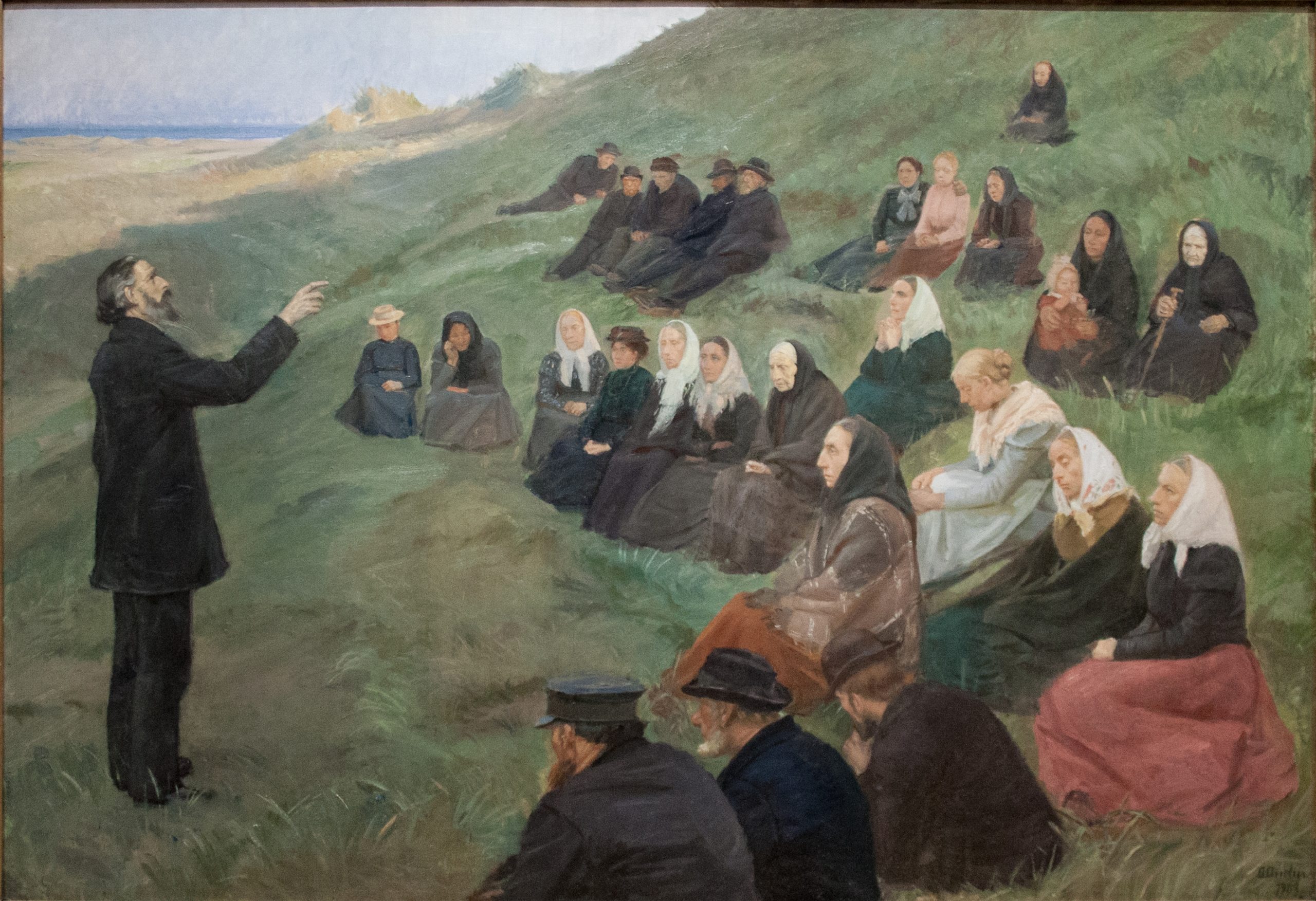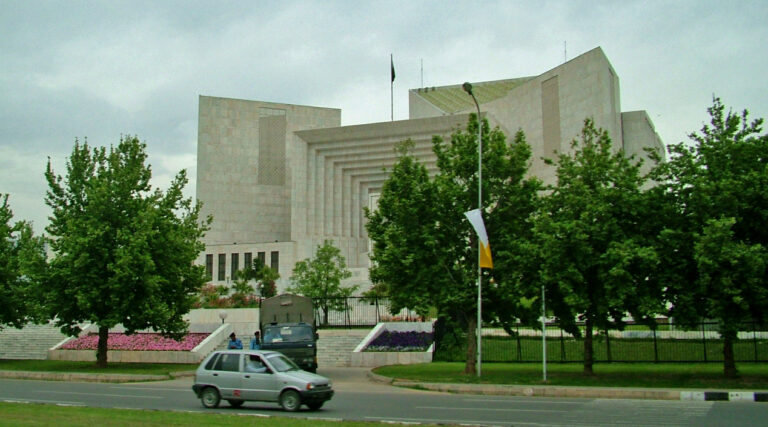
How Will Preachers Address Social Issues During the 2024 Election?
Leah D. Schade, Wayne Thompson, & Amanda Wilson Harper
A Field Sermon by Anna Ancher (CC0 1.0).
Since Donald Trump’s appointment of conservative Supreme Court justices beginning in 2017, the Court released a series of rulings that have had a profound impact on the rights of historically marginalized groups, as well as environmental protection. Regarding immigration rights, the Court ruled in Trump v. Hawaii (2017), that the Executive branch has broad power to exclude aliens seeking entrance into the U.S. Regarding LGBTQIA+ rights, in Masterpiece Cakeshop v. Colorado Civil Rights Commission (2018), the Court ruled in favor of a baker who refused to make a wedding cake for a same-sex couple, citing religious objections. With regards to firearms, the case of New York State Rifle & Pistol Association Inc. v. City of New York (2019) focused attention on Second Amendment issues and effectively limited state and local government rights to regulate firearms. On environmental protection, with the case of West Virginia v. Environmental Protection Agency (EPA) (2021), the Court effectively limited the EPA’s ability to regulate emissions from power plants. And regarding women’s access to reproductive health services, Dobbs v. Jackson Women’s Health Organization (2022), the Court ruled that the Constitution does not protect abortion access, thus overturning Roe v. Wade, 410 U.S. 113, and Planned Parenthood of Southeastern Pa. v. Casey, 505 U.S. 833.
How have mainline Protestant clergy navigated these legal and politically charged issues? For the upcoming 2024 presidential election, how are preachers addressing immigration, LGBTQIA+ rights, firearms, environmental issues, and abortion rights? What kind of reactions do they receive if they preach about these issues? How has willingness to preach about political topics shifted since the Trump presidency?
This article reports results from 2017, 2021 and 2023 surveys of congregational preachers which asked about ministry, preaching, and contested social issues. The repeated cross-sectional study explores willingness to address political issues, depending upon congregation and preacher characteristics. Using surveys from the past seven years, we focus on trends in preaching about immigration, sexuality, firearms, environmental, and reproductive rights, leading toward the 2024 election.
Demographics of the Survey Respondents
Survey waves from 2017 (n=782), 2021 (n=2,600) and 2023 (n=791) included eight denominations and fifty states, the District of Columbia and Puerto Rico. Gender split almost evenly between male and female, 85% were heterosexual, 89% reported white identity, with 88% primarily English speaking. About 75% identified as progressive/liberal, 10% conservative and 15% moderate. Age distribution ranged from early twenties to over age 70, serving congregations worshiping from less than 25 to over 1,000, from rural/small town settings to suburban/urban.
With self-reports, questionnaire research risks social desirability bias. As Clifton Guthrie notes, “Asking preachers via surveys about their own preaching can be like asking folks to calculate their own tax deductions: there is always the temptation to claim too much.” However, our top priority was to measure attitudes and perceptions about ministry, preaching and social issues, not sermon content. Also, with anonymous self-reports, participation across survey waves was not tracked. However, sample variability is offset by triangulation of patterns across survey waves. In other words, if a person’s readiness to speak out on one issue is consistent with their approach to various other topics, the initial concern about their selectivity diminishes.
Preachers Appear More Willing to Address Certain Social Issues
Mainline Protestant preachers were more willing to address controversial topics in their sermons in the years since the election of Trump. In 2017, 31% reported frequent (10+ times/year) preaching or teaching about controversial topics, compared with 55% in 2021 and 47% in 2023, still 1.5 times more than 2017. Willingness to address controversial issues varied by clergy gender and race, also by congregation location and political orientation. Decreases for some topics were also noted. For example, females, or clergy serving conservative, rural congregations and clergy of color serving predominantly White congregations were more reluctant to address controversial topics, compared with males, or White clergy serving mostly progressive White or suburban congregations. Thus, markers of privilege correlate with levels of restraint around some topics.
There were shifts in willingness to address some topics across the three survey waves. In each survey, we gave respondents a list of social issues and asked which ones they intentionally or specifically addressed or incorporated into their preaching or teaching in the previous twelve months. For this article, we consider five issues: immigration, LGBTQIA+ rights, firearms, environment/climate change, and abortion. The data below shows the changes in the percentages of clergy who said they addressed the issue in their preaching or teaching.
Table 1: Trends in willingness to preach about selected topics
| Sermon Topic | 2017 | 2021 | 2023 | 2023:2017 |
|---|---|---|---|---|
| Immigration | 60% | 45% | 47% | 0.78 |
| LGBTQIA+ rights | 52% | 44% | 49% | 0.94 |
| Firearms | 41% | 31% | 57% | 1.39 |
| Environment | 30% | 47% | 74% | 2.47 |
| Reproductive rights | 9% | 7% | 33% | 3.67 |
For 2021, preaching about environment/climate change did not decrease. Eighty-six percent of preachers addressed the pandemic in the previous year, greater than for other issues. For weekly worship, sermon opportunities are limited. The pandemic required significant attention, restricting clergy attention to other topics. Pandemic effects and restrictions eased by the 2023 survey wave. Comparing 2017 and 2023 reduces the impact of the pandemic in the 2021 data. Table 1 shows this comparison, calculated by dividing 2023 by 2017 percentages to produce odds on preaching willingness to summarize trends. Willingness to preach about firearms increased 16%, environment/climate change by 44%, and reproductive rights 22%, with sexuality issues holding roughly equivalent. For immigration, there was a 13% decline. Trends included in Table 1 suggest two seminal questions: reasons for shifts on some issues and implications for topics preachers might address during the 2024 election season.
Influences on Clergy Views of Social Issues and Preaching
While there could be any number of influences accounting for the decrease or increase of attention to social issues in clergy sermons, we highlight three primary drivers: societal, congregational, and personal. Societal drivers are broader than congregations. When global, national, state, local, or community issues affect congregation members’ lives, clergy may use biblical and theological lenses to help parishioners understand controversial topics. In the 2020 survey, the top three reasons respondents gave as “very important” for deciding to address social issues were: connecting scripture/faith with issues that affect people’s lives (88%); because Jesus/the Bible speaks about social issues (87%); and to provide moral, biblical, or theological perspective to an issue (75%).
Congregational factors include the relationships among the parishioners, between the parishioners and the preacher, the health and vitality of the congregation, the setting of the congregation, and the level of push back preachers expect when addressing certain social issues. For example, respondents who indicated their congregations were either very or somewhat divided were much more hesitant to address social issues (62%) than those that were not very divided (24%). In terms of setting, respondents serving rural/small town churches were more hesitant (50%) than their colleagues in urban areas (25%). Preachers who receive strong push back against their sermons on social issues, such as angry emails, withholding offerings, or people leaving, were more hesitant (54%) than those who did not receive push back (37%).
Personal reasons reflect preacher vulnerability. For example, progressive females serving conservative rural congregations are more hesitant to address controversial issues. Another factor is discernment based upon a sense of call, vocation, prayer and ethics. Among respondents who strongly or moderately agreed that “churches should avoid social issues and focus on spiritual issues, 29% said they had no interest in preaching about social issues. For those who believed that the church should put their faith into action through advocacy and social justice, only 2% said they had no interest in preaching about social issues. In other words, if pastors believe faith obligates them, they will be more willing to use sermons for addressing social issues.
Increasing stress levels and burnout have affected capacity to engage challenging issues. In the 2023 survey, 50% of respondents reported high levels of stress and burnout. This correlated with the level of willingness to engage social issues in preaching. Clergy who reported high levels of stress (47%) were hesitant to preach about social issues, compared with 30% reporting low or no stress.
Thus, societal, congregational, and personal influences on hesitancy have affected reports of preaching and teaching about social issues. In the next section, we briefly examine how these influences might affect preaching about five issues during the 2024 election: immigration, sexuality, firearms, environment and reproductive rights.
Immigration
When the Trump Administration enacted the “Muslim ban” in 2017, many clergy spoke publicly against the executive order. This societal driver relates to the high number (60%) who said they preached about immigration issues that year. However, after the Biden Administration reversed some of the policies of the previous administration such as separating families, and forcing migrants to remain in Mexico, it may be that the urgency of the issue diminished for clergy. This may explain the drop to 45% in 2021 and 47% in 2023.
There may be increases in clergy willingness to address immigration issues in 2024. Congressional action has continued to address border security and interior enforcement, permanent and temporary immigration, and asylum. Headlines about migrant caravans and the governors of Texas and Florida sending refugees to more progressive states have highlighted the complexities of immigration intersecting with broader political, social, and economic dynamics.
Many progressive Mainline clergy would likely assent to Rev. Dr. Elizabeth Arnold’s argument published last month in Canopy Forum, that “seeing the stranger as an enemy and working toward keeping them away is incompatible with the teachings of the New Testament.” Arnold asserts that “for those who claim the Bible’s teachings to be authoritative, the New Testament’s unified command to treat the stranger hospitably should be the lens used in considering matters around immigration.” This may lead clergy to be more willing to tackle the topic of immigration during the 2024 election and its aftermath.
Congregational culture and characteristics may be more challenging to assess. Location related to progressive or conservative zip codes, and for those serving in border states, willingness to address immigration, may vary willingness to address immigration. Another factor could be congregational divisions, increasing hesitancy and perceived liabilities among preachers.
LGBTQIA+ Rights
Due to anti-transgender legislation in several states, preachers may experience hesitancy around related issues. Alternatively, for some it may increase the urgency to address sexual identity. According to Trans Legislation Tracker, in 2024 there are 550 bills under consideration in forty-two states, 326 of which are active. According to the tracker’s data, 193 have failed to “block trans people from receiving basic healthcare, education, legal recognition, and the right to publicly exist.”
Congregational culture and characteristics relate to sexuality attitudes and social networks. Denominations may matter in 2024, including the May 2024 United Methodist Church vote to allow gay ordination. In our 2023 survey, just before the great exodus of conservative churches from the denomination, only 36% of UMC respondents said that they addressed LGBTQIA+ issues, compared with 57% of ELCA Lutheran clergy who preached about these issues.
Firearms
Congregational factors are a strong predictor of whether clergy will address firearms in their sermons. In 2023 for example, only 40% of those serving in rural or small-town settings said they preached a sermon in support of gun regulations and stopping gun violence. In contrast, 57% of suburban and 64% of urban pastors preached against gun violence. Congregation racial composition also matters: 71% of preachers serving congregations of color preached against gun violence, compared with 50% serving mostly White congregations.
Internal drivers also determine preacher stances on guns. In the 2021 survey, we found that clergy who voted for Trump were more willing to talk about gun rights than their Biden-voting colleagues were to preach about gun regulations. Considering the number of shootings at houses of worship since 2012, clergy may feel caught between two opposing desires – the need to protect the congregation and the biblical commandment not to murder. According to a 2021 Gallup poll, protection against crime is the number one reason for owning a gun. A 2023 study by Lifeways found that churches are increasingly implementing security measures, including having trained security teams, many of whom are armed (54%). This could not happen without either explicit or tacit approval from clergy leaders.
Societal factors also contribute toward clergy willingness to address firearms. The jump from 41% in 2017 to 57% in 2023 may reflect the rise in the number of mass shootings, from 347 in 2017 to 644 in 2022. In our 2023 survey, 52% said they took a position supporting gun regulations, stopping gun violence, or a related message. Only 1% said they took a position supporting gun rights, the Second Amendment, or a related message. We expect those numbers to stay relatively similar in 2024.
Environment and climate change
Catastrophic weather events have been affecting more communities in recent years. According to the National Centers on Environmental Information, “From 1980–2024 (as of May 8, 2024), there have been 383 confirmed weather/climate disaster events with losses exceeding $1 billion each affecting the United States. These events included 31 drought events, 44 flooding events, 9 freeze events, 191 severe storm events, 62 tropical cyclone events, 22 wildfire events, and 24 winter storm events. Overall, these events resulted in the deaths of 16,420 people and had significant economic effects on the areas impacted.”
Congregations often minister to those affected by these disasters while simultaneously trying to navigate their own way through them. Our survey results suggest clergy draw on biblical and theological resources to advocate for caring for God’s Creation in their sermons and move their congregations to support policies that would mitigate the worst effects of climate change.
Thus, we foresee the number of clergy addressing climate and environmental issues remaining high in 2024 for several reasons. First, even clergy who reported that they received negative pushback on their sermons were willing to address environmental issues at a rate of 82%. Similarly, even those who reported high levels of stress preached on the environment (80%), as well as 68% of those who served conservative congregations, and 74% who served rural or small-town congregations. The biggest predictor of those who did not address environmental issues was vote preference. Only 41% of preachers who voted Republican preached about protecting the environment. Given that conservative voters made up only 11% of mainline Protestant preachers in our samples, we feel confident that environmental issues will remain a pressing concern in 2024.
Abortion
According to the New York Times, “Twenty-one states ban abortion or restrict the procedure earlier in pregnancy than the standard set by Roe v. Wade, which governed reproductive rights for nearly half a century until the Supreme Court overturned the decision in 2022.” As of this writing, the Arizona state legislature voted to repeal an 1864 ban on nearly all abortions. However, a 15-week ban remains in effect. At the same time, fifteen states have enacted additional protections to ensure access to abortion care.
The spotlight on abortion has gone beyond legislation and political talking points. The aftermath of the Dobbs decision has highlighted just how necessary abortion care is for some and the pain and suffering many endure when their state forces pregnancy to term or to wait for treatment or death without legal abortion options. What used to be considered private patient-doctor issues have become public and politicized. However, this has also increased awareness of conditions leading to abortion and refutes simplistic arguments about perceived motives for abortion. These conversations are no doubt influencing dialogue within churches.
We believe these societal factors contributed to the three-fold increase we saw in our surveys of pastors who were willing to address abortion in their sermons. Although, 57% of respondents said they avoided preaching about abortion altogether. Of those who did, 76% preached a message in support of pro-choice and protecting women’s autonomy. One respondent, for example, reported they preached to “shift focus away from the reduction of women to ‘vessels’ when attempted bills removed mental well-being from being considered cause for termination of pregnancy.”
Only 12% preached in support of pro-life and protecting the unborn. Nineteen percent took a more nuanced approach. One respondent wrote, “I have not taken a dualistic stance on abortion aligned with voting but work to help congregants see beyond taking two sides and learn to understand more about the whole spectrum and talk with each other in ways that can bring understanding, and ways to talk with legislators that can be more effective.”
As with the other issues, clergy willingness to address abortion in 2024 will likely depend upon the ways in which personal and congregational factors influence clergy sermons and teaching. For example, those serving rural churches were less likely to address abortion than those serving urban churches by 16 percent. 68% of those serving rural churches said they avoided the topic, compared with 48% of those serving progressive congregations. However, based on our survey results, abortion will continue to receive preacher attention in 2024.
Conclusion
Preachers and congregations are not insulated from social concerns or activities. Religion is a public expression of the sacred. Omar McRoberts claims congregations focused solely on meeting adherent spiritual needs are rare. As Nancy Ammerman notes, “Congregations are not primarily political institutions, but neither are public concerns absent from the religious work they do.” Societal, congregational, and personal orientations and interests affect sermon topic choices. To understand trending preaching topics requires unpacking of factors driving social change, issues that are imported from the broader society and filtered through the complexities of clergy and the congregations they serve. ⬥

Rev. Dr. Leah D. Schade is the Associate Professor of Preaching and Worship at Lexington Theological Seminary in Kentucky. She has authored or co-edited six books, including Preaching in the Purple Zone: Ministry in the Red-Blue Divide (Rowman & Littlefield, 2019), and was project director for a grant funded by the Wabash Center for Teaching and Learning in Theology and Religion studying ministry, preaching, and social issues in theological education.

Wayne Thompson is Emeritus Professor of Sociology at Carthage College. Professor Thompson writes about religious organizations and their leaders. He held research positions with the Presbyterian Church (USA), the Evangelical Lutheran Church in America, and the Archdiocese of New York City before becoming a sociology professor. His doctorate is from University of Connecticut and master degree from University of Arizona, each in sociology with specialty in society and religion. Professor Thompson also writes about diversity, equity and inclusion topics for a newspaper syndicate.

Dr. Amanda Wilson Harper is a graduate school professor at Tarleton State University. She studies social justice engagement and how to foster communities to have hard conversations.
Recommended Citation
Schade, Leah D., Wayne Thompson, & Amanda Wilson Harper. “How Will Preachers Address Social Issues During the 2024 Election?” Canopy Forum, May 29, 2024. https://canopyforum.org/2020/11/25/how-will-preachers-address-social-issues-during-the-2024-election/.
Recent Posts










